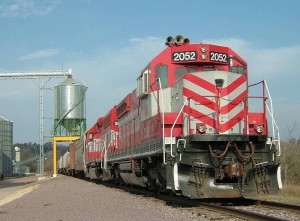Want to boost the Ag Sector? Build new pipelines.
Posted on Jul 29, 2015Agriculture relies on affordable energy to stay competitive. The cost of crude oil and natural gas directly impacts farmers’ ability to maintain a healthy bottom line, driving the costs of necessary expenditures like diesel fuel, irrigation, fertilizer, lubricants and more.
In the past five years, crude oil production in the U.S. has skyrocketed, bringing a surge of economic activity. Our country will surpass Saudi Arabia and Russia as the world’s most prolific producer of fossil energy in 2015. For the first time in decades, the once vaporous concept of American “energy independence” is within reach.
 The boom has been good news for farmers, helping to keep energy prices and operating costs under control. But it has also brought some growing pains – especially in the Midwest – due in large part to the strain that greater production has placed on the region’s freight transportation infrastructure. The increase in crude oil trains has reduced the freight capacity available to transport grain and other commodities. Without action, the future of shipping agricultural goods will be defined by delays, price spikes and uncertainty.
The boom has been good news for farmers, helping to keep energy prices and operating costs under control. But it has also brought some growing pains – especially in the Midwest – due in large part to the strain that greater production has placed on the region’s freight transportation infrastructure. The increase in crude oil trains has reduced the freight capacity available to transport grain and other commodities. Without action, the future of shipping agricultural goods will be defined by delays, price spikes and uncertainty.
I recently partnered with the American Farm Bureau Federation to attempt to quantify the financial impact of regional transportation strain on farmers in the Midwest. We found that the surge in crude oil traffic – combined with other factors, – caused millions of dollars of losses to farmers, elevators and end users. The Agriculture Department confirms that $570 million were lost from Upper Midwest farmers’ profits during the 2014 harvest season alone. In North Dakota, the insufficient freight environment could be expected to reduce the average corn farmer’s income by $10,000 relative to a “normal” year.
Grain producers are uniquely dependent on efficient rail systems, especially in crude oil traffic “hot spots.” The nature of grain production and use renders the industry inflexible with regard to the freight methods that it must use. Grain farmers simply must have access to efficient rail in order to manage shipping costs, minimize delay and get their products to market in an economically competitive manner.
Fortunately, a clear path forward does exist.
Modern pipelines servicing the Bakken region can help provide a solution by channeling hundreds of thousands of barrels of crude oil per day off of the rails and roadways.
The merits of expanding our pipeline infrastructure are many. Pipelines significantly reduce transportation costs, are more efficient, and are impervious to weather or traffic related delays. If other industries were physically able to send their products through a pipeline, they would be delighted to do so.
Comprehensive improvements to the freight network in the Upper Midwest are needed. Rail carriers have responded well to the recent breakdown in service, devoting ample resources and energy to improving capacity and reducing delay. But in order to make the most of our new found energy resources without compromising the competitiveness of our agricultural sector, improved transportation infrastructure devoted to energy is essential. Pipelines are an essential part of that equation.
Source: Elaine Kub, author of AFBF’s recent study, “Insufficient Freight: An Assessment of U.S. Transportation Infrastructure and Its Effects on the Grain Industry,” and “Mastering the Grain Markets: How Profits Are Really Made.”
Tagged Post Topics Include: AFBF, Agricultural Goods, Agriculture, American Farm Bureau Federation, Bakken, Bottom Line, Commodities, Crude Oil, Delays, Diesel, Economic Activity Saudi Arabia, Energy, Energy Independence, Energy Prices, Farmers, Fertilizer, Fossil Energy, Freight Capacity, Freight Transportation, Fuel, Grain, Grain Producers, Irrigation, Lubricants, Midwest, Natural Gas, Oil, Operating Costs, Pipelines, Price Spikes, Production, Rail Systems, Regional Transportation, Russia, Trains, US, US Department of Agriculture, Upper Midwest, USDA
Comments